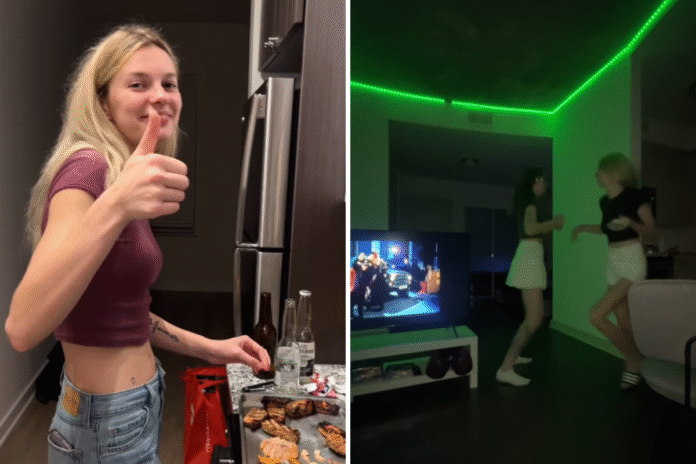HEARTBREAKING: Iryna Zarutska’s Final Voicemail Haunts Family as Mysterious Voice in Recording Deepens Tragedy
In a devastating new detail surrounding the tragic death of Iryna Zarutska, the 23-year-old Ukrainian refugee fatally stabbed on a Charlotte light rail train on August 22, 2025, her family has revealed a chilling voicemail that captures her last words. The message, sent just five minutes after her final text to her best friend Olena, contains a heart-wrenching plea: “Come home soon ❤️.” According to her family, Zarutska’s 14-year-old brother, Bohdan, has listened to the recording 27 times, clinging to the sound of his sister’s voice. Yet, it is the final three seconds of the audio—marked by a faint, unidentified background voice—that has plunged the family into deeper anguish, sparking intense speculation and leaving investigators with a perplexing new clue in an already complex case.

A Life Cut Short
Iryna Zarutska’s story is one of resilience met with unthinkable tragedy. Fleeing Ukraine’s war-torn landscape in August 2022 alongside her mother, Anna, sister, Valeriia, and younger brother, Bohdan, Zarutska sought safety in Charlotte, North Carolina. A gifted artist with a degree in art and restoration from Synergy College in Kyiv, she quickly adapted to her new life. She enrolled at Rowan-Cabarrus Community College, worked at Zepeddie’s Pizzeria, and dreamed of becoming a veterinary assistant. Known for her radiant smile and love for animals, she often cared for neighbors’ pets, earning her a cherished place in her community. Her obituary described her as “the glue of the family,” a vibrant soul whose creativity shone in her eclectic clothing designs and thoughtful gifts of artwork.
On the evening of August 22, Zarutska boarded the Lynx Blue Line at Scaleybark station after finishing her shift at the pizzeria. Dressed in khaki pants, a dark shirt, and her work hat, she sat alone, absorbed in her phone while wearing AirPods. Unbeknownst to her, 34-year-old Decarlos Brown Jr., seated behind her in a red sweatshirt, would soon end her life. Surveillance footage, later released by the Charlotte Area Transit System (CATS), captured the horrific moment: four minutes into the ride, Brown pulled a folding knife from his hoodie, paused briefly, and stabbed Zarutska three times, at least once in the neck. She clutched her wounds, remained conscious for nearly a minute, and collapsed as passengers attempted to aid her. She was pronounced dead at the scene, while Brown was arrested on the platform, charged with first-degree murder and a federal count of causing death on a mass transit system.
The Haunting Voicemail

The voicemail, inadvertently sent to Olena’s phone at approximately 9:55 p.m., is believed to have been triggered by an accidental button press or voice-activated feature on Zarutska’s phone during the attack. The recording captures the chaos of her final moments: rustling movements, muffled gasps, and, according to Olena, “something out of a nightmare.” But it is Zarutska’s voice, saying “Come home soon ❤️,” that has left her family shattered. Her brother Bohdan, in particular, has been consumed by grief, replaying the message 27 times in an attempt to hold onto her memory. The family shared this detail in a statement to local media, hoping to humanize Zarutska amid the public furor over her death.
The final three seconds of the recording, however, introduce a chilling mystery. A faint voice, described as low and indistinct, can be heard in the background. Despite extensive efforts by the family and audio experts consulted by investigators, the speaker remains unidentified. Olena, who listened to the voicemail hours after receiving it, told a family member, “It wasn’t just her pain—it was his voice, like he was talking to himself.” Sources close to the investigation suggest this could be Brown, whose muttering reportedly included disjointed phrases about “mind control” and “signals,” aligning with his alleged confession to police that he attacked Zarutska because he believed she was “reading his mind.” Yet, the possibility of another voice—perhaps a passenger or an unknown figure—has fueled speculation on social media platforms like X, where users demand the audio’s release to “expose the truth.”
A Troubled Suspect and Systemic Failures
Decarlos Brown Jr.’s background has intensified scrutiny of the case. A homeless man with a history of mental illness, Brown was diagnosed with schizophrenia and had been arrested 14 times in Mecklenburg County since 2011 for offenses including robbery with a dangerous weapon, felony larceny, and breaking and entering. His family, particularly his mother, Michelle Dewitt, and sister, Tracey Brown, told CNN that his untreated condition led to erratic behavior, including a 2022 assault on Tracey and paranoid claims about government surveillance. Despite Dewitt securing an involuntary commitment order, legal barriers prevented long-term care, as she was not his guardian. Brown’s release after a January 2025 arrest for harassing 911 operators further highlighted gaps in the mental health and justice systems.

The case has become a lightning rod for political debate. President Donald Trump and conservative commentators have cited it as evidence of “soft-on-crime” policies in Democratic-led cities, with Trump calling Brown a “deranged monster” and advocating for the death penalty. U.S. Attorney General Pam Bondi vowed to seek the maximum penalty, ensuring Brown “will never again see the light of day as a free man.” Meanwhile, Charlotte Mayor Vi Lyles called the incident a “tragic failure by the courts and magistrates,” prompting CATS to increase fare inspections and security staffing. Critics, however, argue that politicizing the tragedy oversimplifies complex issues like mental health care access and public safety.
A Global Outcry and a Family’s Grief
In Ukraine, Zarutska’s death has resonated deeply, symbolizing the fragility of safety even in refuge. Ukrainians like Lyubov, living in North Carolina, expressed dismay at rising violence, while others criticized the U.S. for failing to protect a war survivor. The absence of a strong response from Ukrainian officials, possibly to avoid alienating U.S. political factions, has frustrated some, with speculation that President Zelenskyy may address the case to appeal to Republicans. Social media in Ukraine and beyond buzzes with grief and outrage, with tributes highlighting Zarutska’s kindness and talent. A GoFundMe campaign has raised over $122,000 for her family, who buried her in the U.S. after her father, barred from leaving Ukraine, watched the funeral via FaceTime.
The unidentified voice in the voicemail has sparked rampant theories online. Some speculate it could be a passenger who witnessed the attack but failed to intervene, while others suggest it might belong to an accomplice or even a bystander reacting to the chaos. Audio forensic experts are reportedly analyzing the recording, but its graphic nature has kept it from public release. The mystery deepens questions about what transpired in those final moments and whether additional context could shed light on Brown’s motives or the presence of others nearby.
A Lasting Legacy
Zarutska’s death, and now the haunting voicemail, has left an indelible mark. Memorials at the East/West Boulevard station, adorned with flowers and notes, reflect a community grappling with guilt and loss. Her uncle, speaking anonymously on Good Morning America, called her “the glue of the family,” lamenting the “absolutely terrible” surveillance footage. Friends shared a tribute video on Instagram, capturing Zarutska’s joy in everyday moments—playing cards, swimming, and dancing—underscoring the vibrancy stolen from her.
As the investigation continues, the faint voice in the recording remains a poignant enigma, a final echo of a life cut short. For Bohdan, replaying his sister’s words offers solace amid sorrow, but the unidentified voice underscores an unresolved tragedy. Zarutska’s story—her escape from war, her embrace of a new life, and her brutal end—demands reflection on systemic failures, public safety, and the human cost of violence. Whether the mysterious voice yields answers or remains a ghostly remnant, it ensures that Iryna Zarutska’s memory will endure, urging society to honor her with justice and change.
